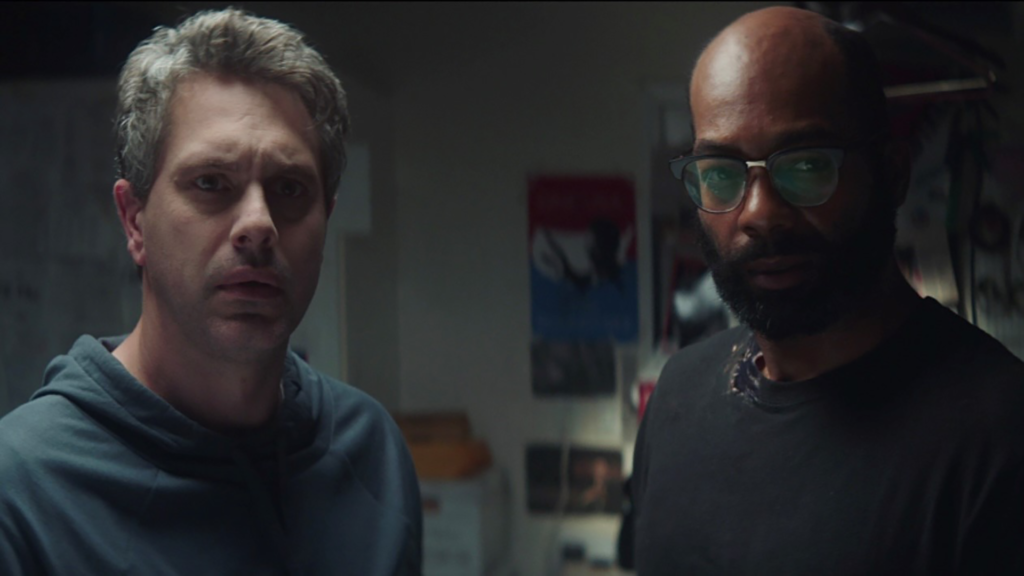November 22, 2022
by Carla Hay

Directed by J.D. Dillard
Some French with no subtitles
Culture Representation: Taking place in 1950 and 1951, in the United States, Italy, France, North Korea, and China, the dramatic film “Devotion” features a predominantly white cast of characters (with some African Americans and Asians) representing the working-class, middle-class and wealthy.
Culture Clash: Based on a true story, Jesse Brown becomes the first African American pilot in the U.S. Navy, and he befriends fellow pilot Tom Hudner, but Jesse experiences racism and self-doubt as obstacles to his success.
Culture Audience: “Devotion” will appeal mainly to people who are interested in watching war movies that have themes of friendship and dealing with challenges, told in a relatively safe and formulaic style of filmmaking.

“Devotion” is sometimes slow-moving and stodgy, but this Korean War drama has its heart in the right place in paying tribute to U.S. Navy pilot Jesse Brown. The cast members give credible performances. The last third of the movie is better than the rest.
At 138 minutes, “Devotion” should have been a shorter movie, because some of the scenes drag on a little longer than they should and don’t do much to move the story along in a more engaging way. However, the crux of the story is meaningful, especially if viewers want to learn more about real-life people who heroically served in the Korean War.
Directed by J.D. Dillard, “Devotion” had its world premiere at the 2022 Toronto International Film Festival. The movie is based on Adam Makos’ non-fiction 2014 book “Devotion: An Epic Story of Heroism, Friendship, and Sacrifice.” Jake Crane and Jonathan A.H. Stewart co-wrote the “Devotion” adapted screenplay.
The movie opens in 1950, when U.S. Navy lieutenant Tom Hudner (played by Glen Powell) is seen leaving Quonset Point Air National Guard Base in Kingstown, Rhode Island, to go to the Naval Air Station in Oceana, Maryland. Tom is going there to be a part of the U.S. Navy’s Fighting Squadron 32, also known as VF-32. Shortly after arriving there. Tom is seen in a locker room, where he meets Anson “Jesse” Brown (played by Jonathan Majors), one of the other VF-32 members who will be going through aviator training with Tom. Their first conversation together shows their immediate rapport.
Jesse asks Tom, who has arrived from Pearl Harbor in Hawaii, if he got to fly in “the big show.” Tom replies, “I did not.” Jesse says, “Then you’ll fit right in.” Tom then meets Marty Goode (played by Joe Jonas), another VF-32 member. Other members of the squad who gets some screen time are executive officer Richard “Dick” Cevoli (played by Thomas Sadoski), Carol Mohring (played by Nick Hargrove), Bill Koenig (played by Daren Kagasoff) and Bo Lavery (played by Spencer Neville). Unfortunately, all of these VF-32 pilot characters, except for Jesse and Tom, are very generic.
Near the beginning of the movie, viewers find out a little bit about Tom’s background from conversations that he has with Jesse. World War II ended just one month before Tom graduated from the U.S. Naval Academy. Originally from Massachusetts, Tom says his career path wasn’t what his family expected: “I was supposed to take over my old man’s grocery stores,” Tom tells Jesse. Tom says he opted for “adventure” instead.
As for Jesse, he is originally from Mississippi, and he doesn’t reveal too much about his background to anyone. He has his guard up because he’s the only African American in the squad. And he will eventually become the first African American to become a pilot for the U.S. Navy. Jesse is happily married to Daisy Brown (played by Christina Jackson), and they are devoted and loving parents to their 3-year-old daughter Pam.
In April 1950, the VF-32 squad spends time training on the aircraft carrier U.S.S. Leyte. Tom excels (he’s the type of trainee who gets perfect test scores) and quickly ascends to the top of the class. Jesse passes the tests too, but Tom is considered the squad’s “star,” who is very straight-laced and “by the book.” Tom and Jesse have a friendly rivalry with each other that occasionally leads to some tense and bitter moments later in the film when their loyalty to each other is tested.
As expected, “Devotion” shows some of the racism that Jesse had to deal with as one of the few African Americans at the time who got to serve in the U.S. Navy alongside (not separately from) his white peers. “Devotion” predictably has a racist bully who’s part of the VF-32 squad. His name is Peters (played by Thad Luckinbill), who openly says racist insults about Jesse, usually in a pathetic attempt to get Jesse to lose his temper. You can almost do a countdown to when Peters and Jesse will get into a physical brawl that Peters instigates.
Publicly, Jesse is confident and avoids trying to define his achievements and skills in terms of his race. For example, at a press event where the VF-32 squad answers questions from journalists, a racially condescending reporter makes a comment to executive officer Cevoli about Jesse, by asking if “your boy does a juggling act too.” While Jesse poses for photos with the other members of the squad, the a reporters tries to bait Jesse into talking about more about his race instead of Jesse’s accomplishments and skills. Jesse doesn’t take the bait.
Privately, Jesse battles with deep insecurities. In multiple scenes in the movie, he is shown by himself, looking in the mirror and crying and/or saying racial insults to himself out loud. It could be interpreted as Jesse using reverse psychology on himself to emotionally prepare himself for any racism he might experience. But mostly, it just looks like Jesse is fighting low self-esteem in the best way that he knows how.
“Devotion” tries to delve into the sense of isolation that Jesse must have felt where he couldn’t really hang out with the lower-ranked African Americans in the U.S. Navy (such as the workers who did jobs in maintenance or in the kitchen), but he wasn’t fully accepted by most of his white peers either, except for Tom. The movie’s handling of this issue doesn’t really go deep enough. It’s well-intentioned at best but superficial at worst. “Devotion” portrays other African Americans in the U.S. Navy as mostly background characters who admire Jesse from afar, except for one scene where they make a collective effort to personally connect with Jesse.
Tom considers himself to be open-minded and not a racist, but even he has a blind spot about race relations in a society built on white supremacist racism. There’s a section of the movie where Tom and Jesse have a conflict over an infraction that could get Jesse into some minor trouble with the U.S. Navy. Jesse explains to Tom that in a racist society, if a black person and a white person do the same thing that’s wrong, the black person tends to get harsher judgment and worse punishment than the white person. “A slap on my wrist is not the same as a slap on yours,” Jesse tells Tom.
Jesse is also sensitive about Tom acting like a “white savior” to Jesse, whereas Tom sees it as wanting to back up Jesse when Jesse experiences racist bullying. Jesse tells Tom, “I can fight my own fights. I’ve been doing it a long time.” Despite these tensions in their relationship, when Jesse and Tom are in the air, they are professional, and they look out for each other in the way that true friends do.
“Devotion” takes a little bit of a detour from the fighter pilot scenes to show some of the VF-32 squad members during some leisure time in Cannes, France. On a beach in Cannes, they meet movie star Elizabeth Taylor (played by Serinda Swan), who is flirtatious with this group of young military men. She is impressed with this squad and invites them to a glamorous party.
When the squad members arrive at the party, which is at a private mansion, two security guards (played by Erik Bello and Michael David Anderson) at the front door are immediately suspicious of Jesse and treat him differently because of his race. They refuse to believe that Jesse is on the guest list, and are so sure of it, they won’t even check the list. Everyone (including members of the squad) are shocked to see that Jesse knows how to speak French. Jesse takes charge of the situation in a confident way that gets them entry into the party.
Because “Devotion” is a male-oriented military film, the movie’s few women who have speaking roles don’t have much to do and are written as solely existing to react to whatever the men do. Jesse’s wife Daisy is pleasant but is essentially depicted as a stereotypical “loyal and worried wife at home” character. Early on in the movie, when Tom is invited to the Brown home for the first time, Daisy literally tells Tom: “I need you to be there for my Jesse.”
The airplane scenes in the movie are watchable but they’re not outstanding. And the movie’s dialogue can often be simplistic and trite. For example, in a scene involving a life-or-death situation, Tom lectures Jesse, “Mistakes get us killed, Jesse.” In another scene, executive officer Cevoli tells Tom that war medals are quickly forgotten and adds, “The real battle in all of life is being someone people can count on.”
Fortunately, Majors and Powell bring enough personality to their roles to make their respective Jesse and Tom characters look like real human beings instead of stereotypes. However, the character of Tom is much less developed than the character of Jesse, since viewers never get much insight into Tom’s personal life. Jesse introduces Tom to Jesse’s family in Jesse’s home. And although Tom seems like the type of non-racist friend who would do the same for Jesse, it’s never shown in the movie.
“Devotion” can certainly satisfy viewers who are looking for some thrilling airplane action scenes, but most of the movie is about the drama that happens on the ground. “Devotion” hits a lot of familiar beats that are seen in many other movies about airplane pilots who are war heroes. It’s far from a groundbreaking film, but “Devotion” has enough heartbreaking moments to make an impact on viewers.
Columbia Pictures will release “Devotion” in U.S. cinemas on November 23, 2022. The movie will be released on digital, VOD and Paramount+ on January 8, 2023.




